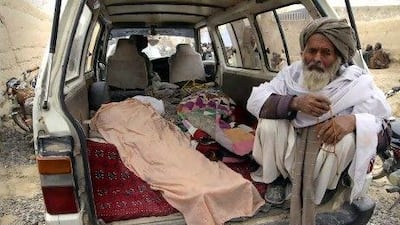WASHINGTON // He is married, a 38-year-old father of two, a sniper who has done several tours of duty in Iraq and Afghanistan, suffered a head injury in Iraq - and has been spirited out of Afghanistan after killing 16 people, mainly women and children and trying to burn their bodies.
The US military will not name the staff sergeant who walked out of his base at 3am on Sunday in the southern province of Kandahar and shot dead people in two villages, one just 500 metres from his base, pending a military investigation.
He was flown to Kuwait on Wednesday night because authorities considered it safer than keeping him in Afghanistan, where a modest backlash has begun. And where a recent public uproar over US troops burning Qurans prompted riots in which dozens of Afghans were killed. Six US soldiers were executed by their Afghan comrades who were angry about the burning.
No one yet knows, or is saying, why the sergeant did what he did.
Soldiers are not allowed to leave their bases alone and an Afghan soldier raised the alarm when the sergeant walked out.
It was while the military base was preparing a search party, General John Allen, the commander of Nato's International Security Assistance Force (Isaf) told CNN on Monday, "that we began to have indications of the outcome of his departure".
The incident underscores an army overstretched, undermanned and over-deployed in two ugly wars - and the one in Afghanistan, already a decade old - will stretch into 2014.
Statistically, about half of the soldiers who have been deployed to Iraq and Afghanistan suffer Post-Traumatic Stress Disorder (PTSD), according to veterans groups. Anecdotally, the rate is much higher.
The US secretary of defence, Leon Panetta, said the sergeant simply walked back to his base and turned himself in. He faces the death penalty.
The US military says he acted alone. But witnesses have said others were involved and it is so far unexplained how he left the base alone, against regulations.
There has been no explanation as to why his base did not respond faster to the alert that a soldier had walked out, or to the shooting so close to the installation.
In all, he walked more than 1.5 kilometres to shoot 16 people, some of them as they slept, and tried to burn 11 of the bodies.
The cruelty of his actions have prompted some to suggest that mental illness or PTSD played a role.
The symptoms of PTSD include flashbacks, hallucinations, nightmares, depression, mood swings, increased aggression, insomnia and not being aware of where you are.
The army says the soldier also suffered a brain injury in a traffic accident on deployment in Iraq.
But experts warn against jumping to conclusions.
Too little is known about the soldier so far, said Bridget Cantrell, a mental health expert with the Hearts Towards Home non-profit organisation that specialises in helping returning service members deal with PTSD.
Nevertheless, she said, "traumatic brain injuries, [personal] relational aspects and the stress of combat can cause a person to go over the edge".
Repeated deployments increase the risk of PTSD, said Dr Cantrell.
A 2010 Stanford study found the risk of PTSD in one deployment was 24 per cent. In a fourth deployment, it is as high as 64 per cent. PTSD also often goes unreported because of the stigma and the lack of awareness among veterans.
In an army that is stretching its resources to the limit, this is a growing phenomenon, said Dr Cantrell.
But it is not new. A century ago, it used to be known as "shell shock".
PJ Dermer, a retired colonel, served multiple tours of Iraq, the last in 2008.
A soldier since 1974, he said the length of the Iraq and Afghanistan wars meant that four deployments for a single soldier was now "the norm. It's even below average".
"We don't have the units to go around, with the numbers that we claimed we needed for the mission," he added.
Such prolonged exposure to combat situations, said Col Dermer, take an inevitable toll.
No one, he says, comes out of war without some measure of PTSD
"Everybody has it. It's impossible not to because of the intensity, the heat, the pressure, the environment ... Being out there for all this time, it drains you," he said.
Sunday's massacre was the latest in a series of incidents in Afghanistan - including US troops burning Qurans and a video of American soldiers urinating on dead Taliban - that have pushed relations to breaking point.
The sergeant's home base, moreover, is no stranger to controversy.
Stars and Stripes, the US military magazine, in 2010 described Joint Base Lewis-McChord in Washington state as the "most troubled base" in the military.
Several soldiers from the base have been involved in violent incidents in the past few years, including four soldiers convicted of killing Afghan civilians in 2010 as part of a "kill squad".
Last week, it was revealed that the psychiatric evaluations of almost 300 soldiers were being reviewed after it emerged that 285 soldiers had PTSD diagnosis overturned so they could return to active duty, reportedly in an effort to save the military money.
But Col Dermer rejected suggestions that Sunday's massacre was a result of any institutional prejudice.
He did not deny that "disdain" towards the local population built up over time.
But all indications, he said, suggested a lone gunman that just "cracked".
The full picture might never be known.
"When they roll it back, they'll see many factors. But not all the factors are apparent, and you will not be able to put them together with an equal sign," said Col Dermer.
These things, however "scary" and "cruel", happen, he said.
The massacre was one of the vicissitudes of war.
Mr Panetta had suggested something similar on Monday, when he told reporters simply: "War is hell."

